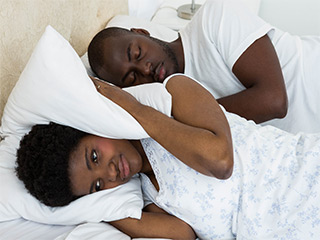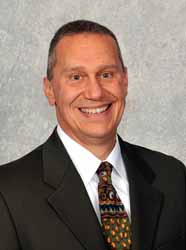Your Snoring May be More Than a Nuisance

By: Fred Rost
I have been a snorer for quite a few years, much to the chagrin of my wife. This often resulted in her having to move to another bedroom and get a terrible night’s sleep. This left me feeling guilty for robbing her of sleep while I got a good night’s rest (or so I thought).
I often felt tired during the day but attributed it to an active lifestyle and a high metabolism that kept me from ever slowing down. I never thought it could be due to my not getting a good night’s rest. After all, my wife told me that I would fall asleep as soon as my head hit the pillow, and I generally slept through the night.
However, she also told me that she would sometimes hear me stop breathing and then gulp for air. As a result, we were pretty sure that I was suffering from sleep apnea, a common sleep disorder caused by a narrowing of the upper airway. During sleep, this keeps oxygen from entering the lungs, resulting in less oxygen reaching vital organs.
In adults, the most common cause of sleep apnea is excess weight and obesity, but it can also be caused by something you’re born with, such as a narrow throat or thick neck. Whatever the reason, sleep apnea puts you at increased risk for high blood pressure, diabetes, heart disease and injury from accidents.
My wife and I talked about my doing a sleep study to confirm our suspicions, but I had an issue with going to a sleep lab and trying to sleep with things attached to my body. Also, being a stomach sleeper, I couldn’t imagine using the sleep apnea treatment at the time: an airflow device called a CPAP machine that required you to sleep on your back while wearing a face mask with straps and hoses all over the place. I was certain I could never get a wink of sleep under such cruel and unusual circumstances!
Fast-forward to January 2018. A friend of mine suffering from sleep apnea told me she had taken a home sleep study (which, by the way, can be scheduled with our Columbia Cardiology office), was diagnosed with obstructive sleep apnea (OSA), and was prescribed the latest technology in CPAP therapy, which allowed her to sleep on her side and not just her back. And most importantly, it was helping her to get a better night’s rest.
I went to see my MPCP physician, took a home sleep study, was diagnosed with severe OSA, and was approved by my insurance carrier to start CPAP therapy. Once I started using the machine, it took me just four days to get used to sleeping with it before I was able to use it throughout the night
The results have been dramatic. I no longer snore. I feel more rested now that I’m reaching a deeper state of sleep, called REM, which my doctor explained is the most restorative stage of your sleep cycle. Before, I was not experiencing REM due to my sleep being constantly interrupted, but that has changed now that I have addressed my sleep issues.
If you suspect that you or a loved one is suffering from sleep apnea, I encourage you to have a sleep study performed, either at a sleep lab or at home, to see if you too would benefit from this technology. As I’m finding out, it can greatly improve the quality of your night’s rest and your overall health.
 Fred Rost is Director of Marketing and Physician Recruitment for MPCP, and a former snorer.
Fred Rost is Director of Marketing and Physician Recruitment for MPCP, and a former snorer.





